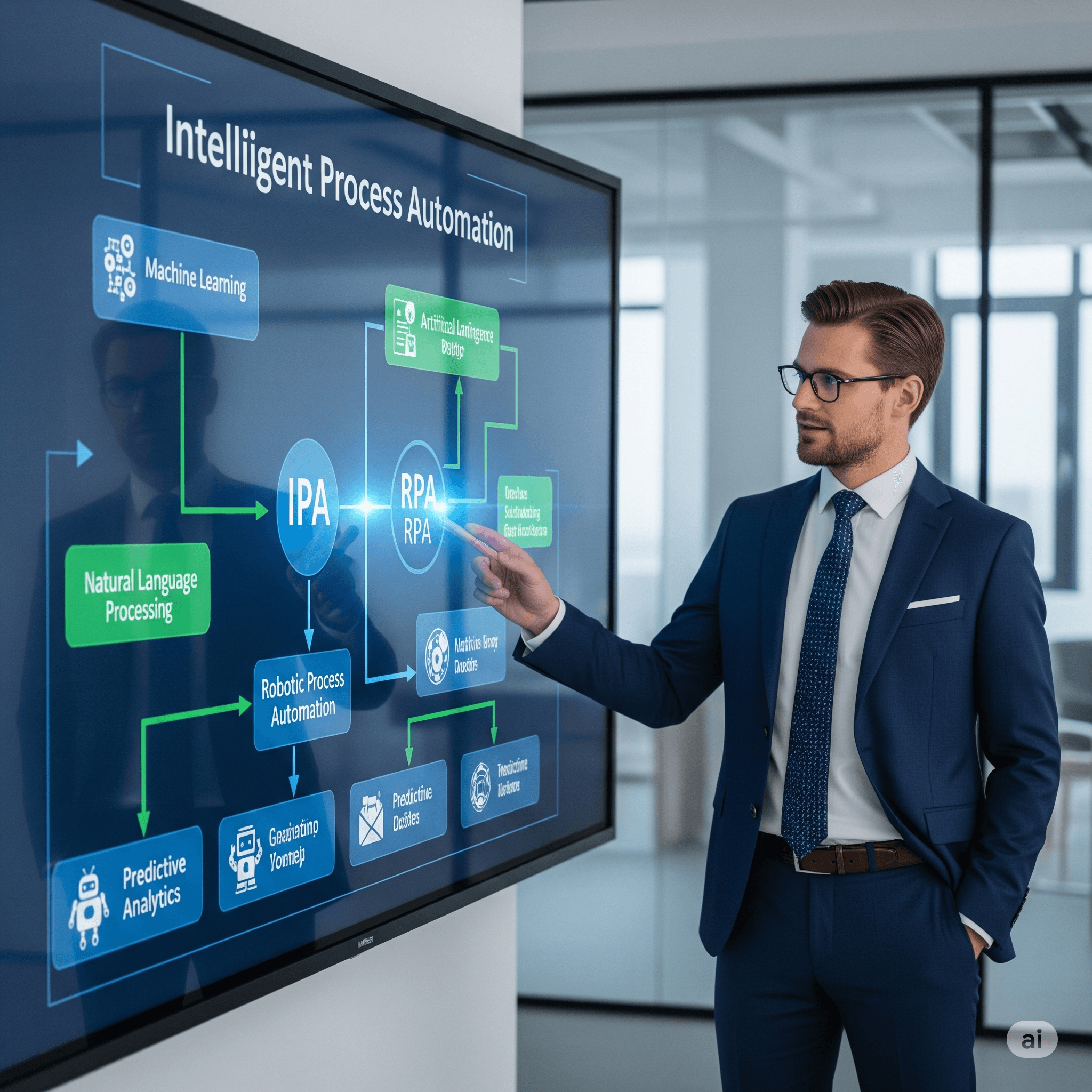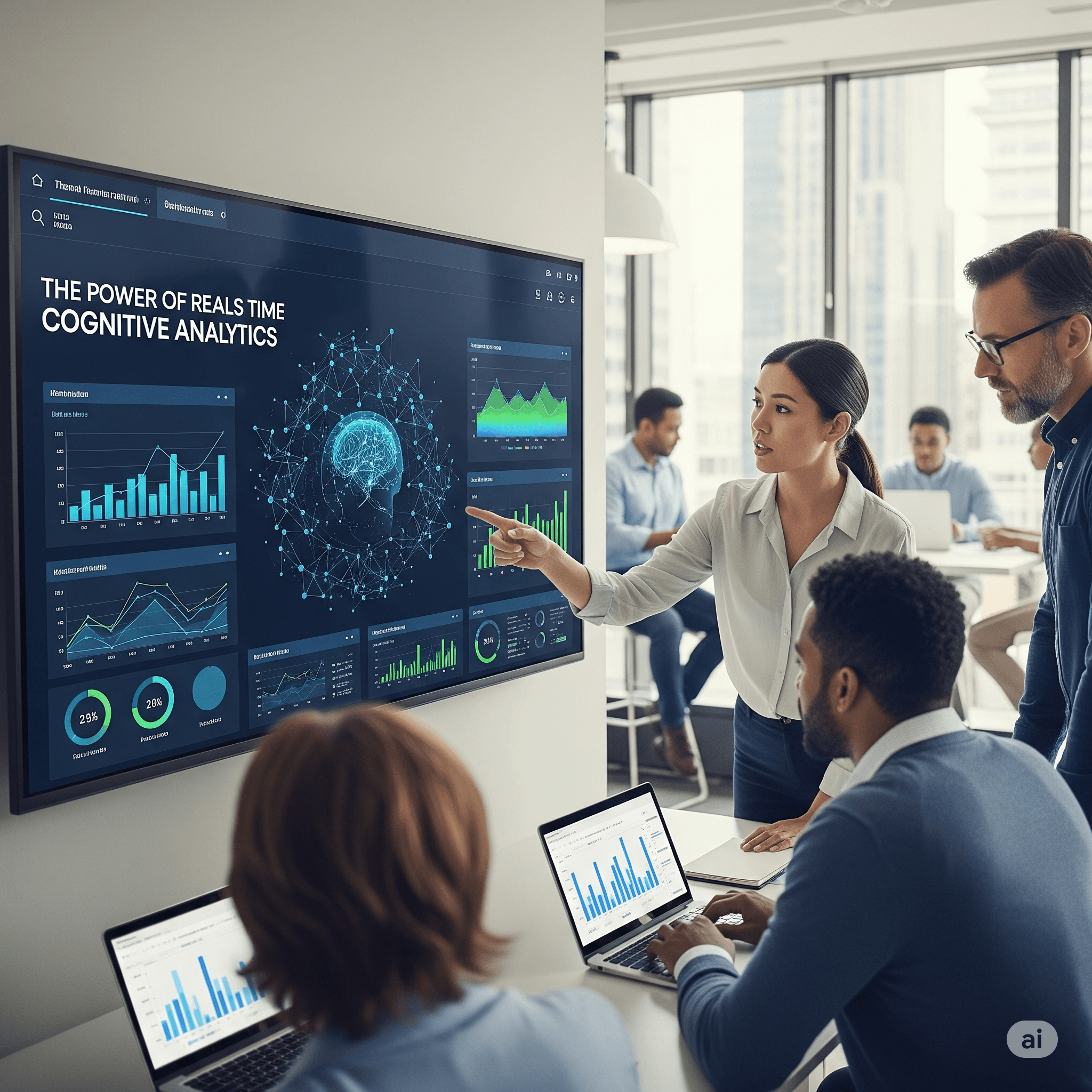The Power of Real-Time Cognitive Analytics: Transforming Business Operations Through Intelligent Insights
Discover how real-time cognitive analytics revolutionizes business operations in 2025 through AI-driven insights, enhanced decision-making, predictive capabilities, and intelligent automation that drives unprecedented operational efficiency and competitive advantage.

Introduction
The Cognitive Analytics Revolution: Market Growth and Impact
The exponential growth of cognitive analytics reflects the urgent need for organizations to extract meaningful insights from the explosion of data generated by digital transformation, IoT devices, social media, and business operations. Unlike traditional business intelligence tools that rely on historical data and predefined queries, cognitive analytics systems continuously learn from new information, adapt to changing patterns, and provide proactive recommendations that anticipate business needs. This evolution from reactive reporting to predictive and prescriptive analytics enables organizations to shift from making decisions based on assumptions to data-driven strategies that optimize outcomes and reduce risks.

Market Growth and Performance Impact
The cognitive analytics market is projected to grow from $6.89 billion in 2025 to $42.23 billion by 2032, while organizations implementing these solutions report 30% faster decision-making, 25% cost reduction, and significant improvements in operational efficiency and customer satisfaction.
- Artificial Intelligence and Machine Learning: Advanced algorithms that learn from data patterns, improve over time, and make automated recommendations for strategic and operational decisions
- Natural Language Processing: Technology that interprets human language from emails, documents, customer reviews, and conversations to extract sentiment, intent, and actionable insights
- Real-Time Data Processing: Continuous ingestion and analysis of streaming data from multiple sources enabling immediate response to changing business conditions
- Predictive and Prescriptive Analytics: Forward-looking capabilities that forecast trends, identify risks, and recommend optimal actions based on comprehensive data analysis
- Augmented Decision-Making: Human-AI collaboration that combines machine intelligence with human expertise to enhance judgment and strategic thinking
Core Technologies Driving Cognitive Analytics
Cognitive analytics leverages sophisticated AI technologies including supervised learning for applications like fraud detection where labeled data helps models recognize suspicious patterns, unsupervised learning for customer segmentation that groups similar behaviors without predefined categories, and deep learning that enhances image recognition, speech processing, and automated decision-making through neural networks. Real-world implementations demonstrate remarkable success, such as IBM Watson for Oncology processing vast medical literature to recommend personalized cancer treatments, and JPMorgan Chase's COiN platform using NLP to analyze legal documents, reducing review time from 360,000 hours annually to seconds.
| Technology Component | Primary Function | Business Application | Performance Impact |
|---|---|---|---|
| Machine Learning | Pattern recognition and prediction from historical data | Customer behavior analysis, demand forecasting | Improved accuracy in predictions and recommendations |
| Natural Language Processing | Understanding and processing human language | Sentiment analysis, document processing, chatbots | Enhanced customer insights and automated communication |
| Computer Vision | Image and video analysis and interpretation | Quality control, security monitoring, medical diagnosis | Automated visual inspection and enhanced accuracy |
| Deep Learning | Complex pattern recognition through neural networks | Advanced analytics, autonomous systems, personalization | Superior performance in complex problem-solving |
Enhanced Customer Experience and Personalization
Cognitive analytics transforms customer experience by enabling businesses to understand customer preferences and behaviors on a granular level, leading to personalized interactions that significantly improve satisfaction and loyalty. Early adopters in eCommerce leverage cognitive insights to create individualized shopping experiences, while service organizations use AI-powered chatbots and virtual assistants that provide emotionally intelligent responses simulating live agents. By recognizing patterns, mining customer data, and learning from each interaction, cognitive systems deliver personalized experiences through natural language processing while automating routine operations to free human agents for high-value customer interactions.
"Cognitive analytics enables businesses to shift from reactive customer service to proactive engagement, anticipating customer needs and delivering personalized experiences that drive satisfaction and loyalty while optimizing operational efficiency through intelligent automation."
— Cognitive Analytics Business Impact Study 2025
Operational Efficiency and Predictive Maintenance
Organizations harness cognitive analytics to overcome resource bottlenecks while gaining predictive insights that augment productivity and efficiency across operations. By combining machine learning, parallel processing, and sophisticated analytics, businesses can process vast amounts of diverse data formats to improve decision-making and strategic planning. General Electric Aviation exemplifies this approach by using cognitive analytics to predict aircraft engine failures before they occur, analyzing real-time sensor data to help airlines avoid costly unscheduled maintenance while enhancing passenger safety through proactive intervention strategies.
- Predictive Maintenance: AI algorithms analyzing equipment sensor data to predict failures before they occur, reducing downtime and maintenance costs
- Supply Chain Optimization: Machine learning models optimizing inventory levels, delivery routes, and supplier relationships for cost reduction and efficiency
- Resource Allocation: Intelligent systems optimizing workforce scheduling, equipment utilization, and capacity planning based on demand predictions
- Quality Control: Computer vision and AI-powered systems detecting defects and anomalies in real-time during manufacturing processes
- Process Automation: Cognitive systems automating complex business processes while learning and adapting to improve performance over time
Risk Management and Financial Services Applications
The financial services industry benefits significantly from cognitive analytics' ability to aggregate insights from various reports, documents, and historical data while improving compliance and reducing risks. Cognitive computing processes both structured and unstructured data from diverse sources, providing capabilities to mitigate risk while adding value through better customer experiences and improved security compliance. Financial institutions leverage these capabilities to detect fraudulent transactions in real-time, assess credit risks more accurately, and ensure regulatory compliance through automated monitoring and reporting systems that adapt to changing regulations.

Healthcare and Medical Applications
Healthcare organizations utilize cognitive analytics to analyze patient data, predict disease outbreaks, and personalize treatment plans while improving diagnostic accuracy and operational efficiency. Machine learning algorithms help hospitals predict patient readmissions and optimize resource allocation, while cognitive systems assist in diagnosing diseases by analyzing medical images with greater speed and accuracy than traditional methods. These applications demonstrate how cognitive analytics can save lives while reducing costs and improving healthcare delivery across diverse medical specialties and care settings.
Healthcare Transformation
Cognitive analytics in healthcare enables faster diagnoses, personalized treatment plans, predictive patient care, and optimized resource allocation, leading to improved patient outcomes while reducing operational costs and enhancing care quality across medical organizations.
Manufacturing and Industrial Optimization
Manufacturing companies leverage cognitive analytics for predictive maintenance, quality control, supply chain optimization, and process improvement that delivers measurable operational benefits. Machine learning algorithms optimize manufacturing processes by identifying inefficiencies, predicting equipment failures, and recommending process improvements based on historical performance data and real-time sensor information. This enables manufacturers to reduce waste, improve product quality, minimize downtime, and optimize production scheduling while maintaining safety standards and regulatory compliance requirements.
| Manufacturing Application | Cognitive Technology | Business Benefit | Measurable Impact |
|---|---|---|---|
| Predictive Maintenance | ML algorithms analyzing sensor data | Reduced equipment downtime and maintenance costs | 20-30% reduction in maintenance expenses |
| Quality Control | Computer vision and deep learning | Automated defect detection and quality assurance | 99%+ accuracy in defect identification |
| Supply Chain Management | Predictive analytics and optimization algorithms | Optimized inventory and delivery scheduling | 15-25% reduction in supply chain costs |
| Energy Management | AI-powered consumption analysis | Optimized energy usage and cost reduction | 10-20% improvement in energy efficiency |
Real-Time Decision-Making and Business Agility
The demand for real-time insights drives cognitive analytics adoption as businesses need faster analysis capabilities to make timely decisions in rapidly changing market conditions. Real-time cognitive analytics processes streaming data from multiple sources including customer interactions, market feeds, operational systems, and external data sources to provide immediate insights that enable rapid response to opportunities and threats. This capability transforms organizations from reactive to proactive, enabling them to anticipate market changes, respond to customer needs instantly, and optimize operations dynamically based on current conditions rather than historical trends.
- Streaming Data Processing: Continuous analysis of data flows from multiple sources enabling immediate insight generation and response
- Dynamic Pricing: Real-time price optimization based on demand patterns, competitor analysis, and market conditions
- Customer Journey Analytics: Instant analysis of customer interactions across touchpoints to optimize experience and conversion
- Operational Intelligence: Real-time monitoring of business processes with automatic alerts and recommended actions for optimization
- Market Intelligence: Continuous analysis of market trends, competitor activities, and industry developments for strategic advantage
Implementation Challenges and Solutions
Despite significant benefits, organizations face challenges implementing cognitive analytics including data quality issues, integration complexity, skill gaps, and change management requirements. Successful implementation requires comprehensive strategies addressing data governance, infrastructure modernization, talent development, and organizational culture changes that support data-driven decision-making. Leading organizations approach cognitive analytics implementation through phased rollouts that demonstrate value quickly while building capabilities and stakeholder confidence for broader adoption across business functions.
Implementation Success Factors
Successful cognitive analytics implementations require addressing data quality, system integration, workforce training, and change management through comprehensive strategies that build capabilities incrementally while demonstrating measurable business value and ROI.
Privacy, Security, and Ethical Considerations
As cognitive analytics systems process vast amounts of sensitive data including customer information, financial records, and proprietary business intelligence, organizations must implement robust security measures and ethical frameworks that protect privacy while maintaining system effectiveness. Key considerations include data encryption, access controls, audit trails, and compliance with regulations such as GDPR and CCPA that govern data processing and privacy rights. Explainable AI becomes increasingly important to ensure decision transparency and build trust with stakeholders who need to understand how cognitive systems reach conclusions and recommendations.
- Data Privacy Protection: Comprehensive data governance frameworks ensuring compliance with privacy regulations and protecting sensitive information
- Algorithmic Transparency: Explainable AI systems that provide clear reasoning behind recommendations and decisions for stakeholder understanding
- Bias Prevention: Continuous monitoring and adjustment of algorithms to prevent discrimination and ensure fair treatment across diverse populations
- Security Framework: Multi-layered security approaches protecting cognitive analytics systems from cyber threats and unauthorized access
- Ethical AI Governance: Policies and procedures ensuring responsible AI use that aligns with organizational values and societal expectations
Future Trends and Emerging Technologies
The future of cognitive analytics will be shaped by advances in generative AI, edge computing, quantum computing, and augmented analytics that promise even more sophisticated capabilities for processing complex data and generating insights. Edge computing will enable real-time cognitive analytics at the point of data generation, reducing latency and improving response times for time-critical applications. Quantum computing may revolutionize complex optimization problems, while generative AI will create new possibilities for automated content creation, scenario modeling, and decision support that enhances human creativity and strategic thinking.

Measuring Success and ROI
Organizations measuring cognitive analytics success track both operational improvements and financial returns including decision-making speed, accuracy improvements, cost reductions, revenue increases, and customer satisfaction metrics. Successful implementations demonstrate clear ROI through measurable improvements in key performance indicators such as reduced processing time, improved prediction accuracy, enhanced customer engagement, and operational cost savings. Advanced analytics dashboards provide real-time visibility into system performance, business impact, and areas for continued optimization and investment.
| Success Metric | Measurement Method | Typical Improvement | Business Impact |
|---|---|---|---|
| Decision Speed | Time from data availability to action taken | 30% faster decision-making | Improved competitive advantage and responsiveness |
| Operational Costs | Cost per transaction or process | 25% cost reduction | Enhanced profitability and resource efficiency |
| Prediction Accuracy | Accuracy of forecasts vs actual outcomes | 15-20% improvement in accuracy | Better planning and risk management |
| Customer Satisfaction | Satisfaction scores and engagement metrics | Significant satisfaction improvement | Higher retention and revenue growth |
Conclusion
The power of real-time cognitive analytics represents a paradigm shift from traditional business intelligence to intelligent, adaptive systems that mirror human cognitive abilities while processing information at unprecedented scale and speed. With the market projected to reach $42.23 billion by 2032 and organizations reporting up to 30% improvement in decision-making speed alongside 25% cost reductions, cognitive analytics has proven its transformative potential across industries from healthcare and finance to manufacturing and retail. Success in implementing these powerful technologies requires more than technical deployment—it demands comprehensive strategies addressing data quality, system integration, workforce development, and change management while maintaining focus on privacy, security, and ethical AI practices. The organizations that will thrive in 2025 and beyond are those that view cognitive analytics not as a replacement for human intelligence but as an amplifier that enhances human decision-making, creativity, and strategic thinking while enabling unprecedented operational efficiency and competitive advantage. As emerging technologies including generative AI, edge computing, and quantum processing continue advancing, the most successful cognitive analytics implementations will be those that maintain adaptability and continuous learning capabilities while building trust through transparency, fairness, and measurable business value that benefits both organizations and the stakeholders they serve.
Reading Progress
0% completed
Article Insights
Share Article
Quick Actions
Stay Updated
Join 12k+ readers worldwide
Get the latest insights, tutorials, and industry news delivered straight to your inbox. No spam, just quality content.
Unsubscribe at any time. No spam, ever. 🚀
